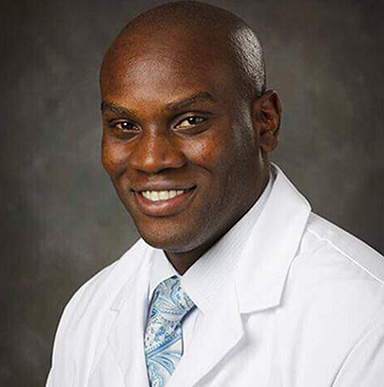Brian Temple
Meet FDU Alumni Brian Temple
Infectious Disease Specialist Confronts COVID-19

Nothing has Prepared Doctors for the Quickly Spreading Virus
Most of us are doing our best to avoid the kind of contact that could spread COVID-19. But for Brian Temple BS’00, MS’01, MD, FACP, a physician who specializes in infectious diseases, exposure to the virus is all in a day’s work.
But even Dr. Temple, who is the infectious disease physician and chair of the Infection Prevention Committee at the Aurora Medical Center in Oshkosh, Wis., and who has worked to mitigate outbreaks of ebola and SARS, expresses surprise at how virulent the coronavirus is.
“It’s been interesting,” he says. “Even as we are setting policies, within the system, about PPE [personal protective equipment], guidelines are changing. And it’s been challenging to make sure that we have the correct PPE for those who are in direct patient contact.”
Winnebago County, where Dr. Temple works, has been “relatively lucky” so far. Dr. Temple says that most of Wisconsin’s cases of COVID-19 have been clustered in Milwaukee and, in any case, Wisconsin has not yet become a viral hotspot. Dr. Temple is relieved that cases have been limited, but believes that this may have prevented him and his colleagues from getting the most accurate and current information about the virus.
Dr. Temple says he became aware that a virus in China was spreading in January. “We were just keeping an eye on the news,” he says, “because there was not yet clear information about how the virus was transmitted—whether it required person to person contact or whether it was airborne. Airborne pathogens spread much more quickly.”
The speed with which things changed, says Temple, is illustrated by the fact that he and his fiancée, a social worker who works with patients in nursing homes and assisted living facilities, decided to take a planned vacation to the Caribbean in February. “The week we came back,” he says, “cases started appearing in Seattle.”
“At that point, the question that everyone was asking became ‘how long has the virus been here?’”
“Initially,” says Dr. Temple, "the thought was that transmission was associated with the cruise ships.” The number of those infected began mounting in Europe, but it appeared that public health officials were still not concerned with community transmission in the United States.
Like many medical professionals in the front lines of the COVID-19 fight, Dr. Temple believes that projections about the virus will not be reliable until there is adequate testing.
Dr. Temple, whose family immigrated to the United States from Sierra Leone when he was nine, graduated from high school at 16 and earned his bachelor’s and master’s degrees in biology from Fairleigh Dickinson.
“Because I attended FDU at such a young age, a lot of molding occurred there,” Dr. Temple recalls. “And it provided me with a good foundation for medical school, in terms of developing critical thinking skills and learning to be more personable. I met people from all over the world while I was at college.”
While he and his fiancée may have gotten their Caribbean vacation in under the wire, the pandemic has put a number of other plans on hold. He cancelled a trip to visit his mother and sister in New Jersey in March. And he and his fiancée were to be married in August, which, he now believes, will have to be postponed.
Dr. Temple has looked at the way that other emergent viruses have impacted populations in order to try to extrapolate what we might expect from a second COVID-19 wave. But there is little on which to base those kinds of predictions. “The way this one is acting is different than anything that we have seen before.”